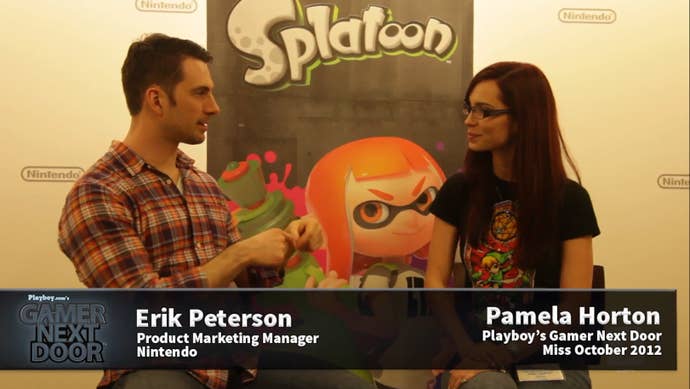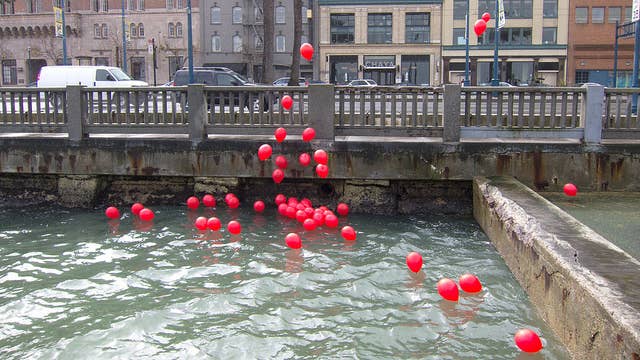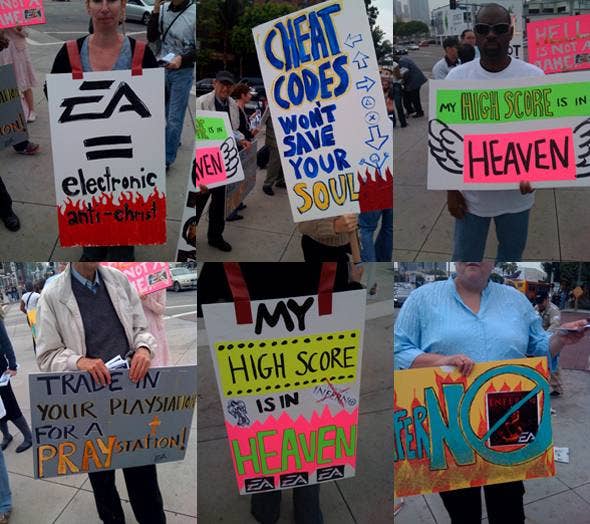Playboy's Splatoon Video Is Coverage, Not Marketing (and a Few Real Marketing Missteps)
It's not some marketing gimmick, but here's some real marketing gimmicks that went horribly wrong.
This article first appeared on USgamer, a partner publication of VG247. Some content, such as this article, has been migrated to VG247 for posterity after USgamer's closure - but it has not been edited or further vetted by the VG247 team.
Yesterday, Playboy.com released a video in its Gamer Next Door series, with two of its Playmates taking a look at Nintendo's upcoming family-friendly shooter, Splatoon. Amelia Talon and Pamela Horton, both Playmates from 2012, host the video. Possibly because of the previously Nintendo-sanctioned Bayonetta nude photoshoot - cosplayed by Horton - many got the wrong idea about this preview, merely looking at the title and not much else.
Cue comments about "white ink", "my hardware", aiming for the "hardcore", or any number of jokes related to the sexual content of Playboy's long-running magazine. Many even wondered why Nintendo partnered with Playboy to make the video preview at all, assuming it to be a cynical marketing campaign. "Don't they understand who Splatoon should be aimed at?" they asked.

Yes, Nintendo understands Splatoon's potential audience. Watch the video. What you'll find is a well-done overview of the game. Talon handles most of the explaining and on-screen playing, while Horton interviews Nintendo product marketing manager Erik Peterson. It's a quick look that would be fine on any site, mostly because Playboy.com is currently positioning itself as a general entertainment page focused on men, like Maxim.
This video isn't a marketing misstep or an attempt by Nintendo to pander to a different audience for Splatoon. Playboy.com reviews and previews games now and Nintendo invited them to take a look at Splatoon along with every other journalistic outlet they invited. It's not a poor marketing idea, it's just an informative video created by people who play games.
My friends, there have been real marketing missteps in our past. Come join me on this trip through the darkness.
Acclaim Wants You to Name Your Child Turok, Deface Gravestones

In the early 2000s, Acclaim was trying to reclaim the place of relevance it had during the Nintendo 64 era. This meant new sequels in two franchises based on Valiant's comics universe: Turok Evolution and Shadowman: 2econd Coming. Acclaim wanted both titles to mount a solid comeback for the company, so they went all out with the marketing.
For Turok: Evolution, they offered parents $10,000 to name their newborn child "Turok". Sure, it was a savings bond for the child, but that's still a kid saddled with the name "Turok". Turok is a marginally good comic series and a great pair of N64 games, but having your son or daughter carry around the name Turok for life is simply a punishment, plain and simple.
"We're giving birth to our biggest game, so it's a natural tie-in," said Acclaim spokesperson Alan Lewis at the time. "People have been naming their kids after movie and sports celebrities for years--why not games?"
No. Just... no.
They followed the Turok: Evolution campaign with the equally-misguided Shadowman: 2econd Coming campaign. The idea here was they would pay families to let them put Shadowman billboards on their relatives' gravestones. Because defacing a monument to the life and death of a loved one is worth a bit of pocket change.
Homefront: 10,000 Red Luftballons

For its upcoming shooter Homefront, a game about North Korea invading and successfully occupying the United States, THQ decided to perpetuate its own red scare. The publisher released 10,000 red balloons in San Francisco during GDC 2011. Each balloon carried a postcard promoting the game and floated aloft on the power of helium. Of course, many of the balloons eventually found their way into the San Francisco Bay, where many citizens worried about their environmental impact.
THQ and the Balloon Council (this is a real thing), insisted that the balloons posed no threat to the wildlife in the area as they were biodegradable, but the anger persisted. In the end, THQ had to hire a cleanup crew to remove the leftover balloons from the Bay.
Every Evony Ad Ever

If you've lived through the dark ages of the Internet - which is a time that spans from when the internet went public until now - then you've probably heard of Evony. Evony is a Flash-based, free-to-play, strategy MMO. It's a horrible game that at one point lifted art and text from titles like Civilization and Age of Empires. Like many bad free-to-play games, you'll inevitably run up against a gameplay wall where you'll have to pay cold, hard cash to move on. It's just painful all around for a title that still bills itself "the best free-to-play MMO Strategy Game there is!"
The problem is, for a time, Evony ads were everywhere. They tend to feature beautiful women in various states of undress, usually with some mention of "my Lord" and a big "Play Now" button. Setting aside the fact that some ladies like lady porn too, so sticking with "My Lord" is reductive, these ads had little to do with the actual game. They're like throwing Bryan Cranston all over the trailers of the new Godzilla film, only to have viewers realize he's only in the film for around 10 minutes. I don't know who fell for the Evony ads, but imagine the pit of despair nestled in their stomachs when they found out the game had nothing to do with the ads. It's heart-breaking.
Dante's Fake Protest

For its edgy God of War-style action game, Dante's Inferno, Electronic Arts had a genius promotional idea. It hired 20 people to stand outside of E3 2009 and fake a religious protest of the title. The fake Christian protesters held signs saying things like "Hell is not a Video Game" and "Trade in Your PlayStation for a PrayStation". It did strike attendees as odd that this religious group was protesting a game almost no one knew about, outside of those who saw the announcement trailer released a few months before E3, but no harm, no foul right?
Nope. Some actual Christians hated being held up as fake boogeymen to promote Dante's Inferno. One blogger outright called the stunt "anti-Christian". And it's not like it particularly helped the game's promotion at E3, the largest annual promotional event the game industry has. Just show the game and call it a day, folks.
All I Want for Xmas is a PSP
Sony paid someone to make this attempt at a viral advertisement happen; they would've been better off simply hiding some money in every PSP. The company in question was Zipatoni, an agency that supposedly was a master in viral marketing. In addition to the video above, Zipatoni created a whole blog at alliwantforxmasisapsp.com that was supposed to be two young men trying to score a PSP for Christmas. When someone eventually figured it out, potential customers were livid at Sony's attempt at viral deception, leading to a pushback on Zipatoni's entire PSP campaign.
"Busted. Nailed. Snagged. As many of you have figured out (maybe our speech was a little too funky fresh???), Peter isn't a real hip-hop maven and this site was actually developed by Sony. Guess we were trying to be just a little too clever. From this point forward, we will just stick to making cool products, and use this site to give you nothing but the facts on the PSP," said the last post on the fake blog.
Sony later deleted the website above and has tried desperately to get the rap video taken down, but the internet never forgets. Of course, then they followed the Zipatoni campaign with this ad for the white PSP and well... the PSP Go. Sony can't win sometimes.
Those are marketing missteps. The Playboy video is just two women reporting on video games. Now you understand the difference. Go and sin no more, my children. (I lament the Google Ads this article will summon.)


















